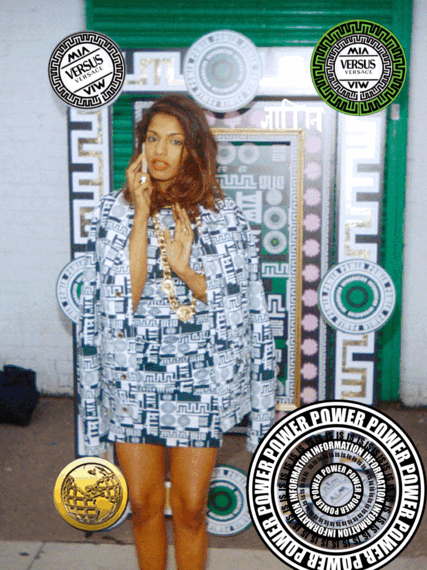MATANGI may be M.I.A.'s most anticipated album just off the strength of its delays.
Named after and inspired by the hindu Goddess of spoken word and music Mathangi, the LP has an energetic first half before giving way to a more meditative second act.
The first thing you'll notice is M.I.A.'s poise. She sounds completely self-confident -- she's more assured than ever. Reappropriating Drake's "The Motto" (YOLO) for album standout "Y.A.L.A," lets us know she isn't courting favor in the rap world. Instead, her focus is on the spiritual like reincarnation and karma. In her own words "YOLO? I don't even know anymore...
If you only live once why we keep doing the same shit/Back home where I come from we keep being born again and again and again/ That's why they invented karma." It seems like the message might be getting through to Drake, if the intro of Nothing Was The Same is any indication: "Tryna get my karma up, fuck the guilty and greedy shit."
In Hinduism, "maya" is the manifestation of the physical world, humans are not supposed to experience maya, it's a transitory ground that you pass through before Nirvana. This could stand as a metaphor for M.I.A.'s artistic evolution; her album /\/\/\Y/\ was the knife that pierced the veil of maya to reach Nirvana -- the state of peace with herself that's present in Matangi.
Sonically, "Matangi" is a melting pot of a few different musical traditions. "We like fucking carpets, you like fucking brooms" she spits on "Bring The Noize." Here, M.I.A. functions as a sort of liaison between the west and the east; big drums, tamil sonority, Kollywood samples, genius beat switches and OM mantras contribute to make M.I.A.'s latest effort cohere.
The primordial vibration produced by the OM on a minimal beat opens up the album. It's "Karmageddon" where M.I.A. whisperingly suggests the audience to use "new keys to type old deeds." The first track creates an intimate and emotional atmosphere but it has an educational purpose as well. Here, like in the Hiranyagarbha -- the golden embryo -- she's celebrating the Creation.
In opposition to the Christian Armageddon, "Karmageddon" refers to the continuous cycle of samasara. In a peaceful tone she sings "It's an open ceremony and we all start the same / Cells grow to cellphone, some form stars" recalling the "Dance of Shiva" where the all permeating consciousness -- God -- creates matter. The verse "my words are my armor and you're about to meet your karma" concludes the track and addresses what M.I.A. called "a fuck you" to the haters and a "thank you" to the supporters.
Faithful to her track "20 $," Maya puts once again dedicates a song to putting underrepresented groups on the map on the title of track "Matangi." She's calling out people from forty different countries including Cuba, Chile, Mali and U.K.; if you feel a little bit disappointed by her not mentioning your country; well, you probably get to live in America so check your privilege.
Though M.I.A. sounds more relaxed and less angry, she's still rightly focused on the Tamil genocide in Sri Lanka; her concern is visible in "Bring The Noize" where she spits "ex-convicts are diplomats" which is likely addressed to Sri Lankan General Shavendra Silva.
M.I.A. flexes on "Boom skit." How she burns through topics in just 76 seconds is impressive; from American racism, to Madonna's eccentricity, to KONY 2012's Goldstein Effect to xenophobia and drones.
In "Lights" she shows her humility in front of her protégé, Rosaly Pfeffer adopting her wonderful and fresh "island-beach-music" style.
On "Exodus," M.I.A. puts herself in the shoes of Antoine de Saint-Exupéry's "Little Prince" whilst asking "You can have it all, but tell me what for?" This sounds like an extension of her 2010 Q-Tv interview where she points out: "I don't understand why it has to be a chart that looks like the same fucking chart as the growth of like a Mac or something?"
Matangi, unlike /\/\/\Y/\, M.I.A. sounds like both Madonna and Johnny Rotten. The dose of fun vs activism, joyful vibes vs dark atmosphere is perfectly balanced. The only bad note seems to be "Bad Girls," a too dated track that hardly fits the complexity of the record.
"I wanted to see if I could write songs about something important and make it sound like nothing," she said in a 2004 interview. Today it's safe to say that risk paid off, but how many listeners are delving into the lyrics?
On the first listen Matangi, is like one of those books that you wanna stay up and read. With Matangi M.I.A. is the tenured cool professor, doling out lessons and earworms.
By Nino Vitale
What do you think of Matangi? Sound off in the comments, or tweet @RockGenius on Twitter!
Check out the annotated lyrics for Matangi here:
M.I.A. - Karmageddon Lyrics
M.I.A. - Matangi Lyrics
M.I.A. - Only 1 U Lyrics
M.I.A. - Warriors Lyrics
M.I.A. - Come Walk With Me Lyrics
M.I.A. - ATENTion Lyrics
M.I.A. - Exodus Lyrics
M.I.A. - Bad Girls Lyrics
M.I.A. - Boom Skit Lyrics
M.I.A. - Double Bubble Trouble Lyrics
M.I.A. - Y.A.L.A. Lyrics
M.I.A. - Bring The Noize Lyrics
M.I.A. - Lights Lyrics
M.I.A. - Know It Ain't Right Lyrics
M.I.A. - Sexodus Lyrics
